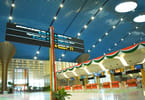U.S. airlines will be told they should check the private-plane flying records of pilots who are applying for jobs, part of an effort by regulators to boost regional carrier safety after a crash near Buffalo, New York.
The Federal Aviation Administration, following an all-day meeting with industry, said it also plans to update rules designed to prevent pilot fatigue and to ask more carriers to voluntarily share data with the government to improve safety.
The FAA wants “to make sure that people have the feeling that when they board a regional jet, it will be safe, and it will be flown by a pilot that’s well trained and well rested,” Transportation Secretary Ray LaHood told reporters today.
The FAA, part of LaHood’s agency, is taking action after the February crash at Pinnacle Airlines Corp.’s Colgan unit, the sixth consecutive fatal accident of a commercial passenger carrier that involved a regional airline. The crash killed 50.
Pinnacle has said Captain Marvin Renslow didn’t disclose that he had failed two flight tests in small planes when he applied in 2005 to join Colgan. FAA test records for such pilots aren’t available to airlines unless applicants waive their privacy for prospective employers.
The FAA in 2007 reminded carriers they can ask pilots for waivers to gain access to the records. Now, the FAA is going to recommend they do so, agency Administrator Randy Babbitt told reporters. The FAA also may recommend that Congress change the law to make pilot records more accessible.
Rules on Rest
Pinnacle, based in Memphis, Tennessee, has said it didn’t know whether Colgan would have hired Renslow had it been aware of his test failures.
Babbitt also said he wants to update rules, on the books since 1985, requiring pilots to get eight hours of rest in the 24-hour period before they complete a flight assignment.
The requirement could change given advances in research, Babbitt said. For instance, a pilot who makes only one landing in a shift may be able to fly longer, while a pilot who makes several landings a day, requiring more concentration, may need shorter shifts, he said.
“Some of the things I’ve seen and heard about practices in the regional airline industry are not acceptable,” Babbitt told industry officials gathered for an all-day meeting. “We need to look more deeply into what’s happening.”
He told reporters he would ask carriers to voluntarily join federal safety programs, such as one in which flight data recorders are regularly analyzed by the FAA for safety flaws. Carriers that don’t choose to participate will be disclosed to the public, he said.
پائلٽ ادا
Babbitt also said he is encouraging the industry to examine regional-pilot pay.
“If you want to get the best and the brightest, you are not going to do that for very long with $24,000,” Babbitt said, referring to the salary of one of the pilots in the Buffalo crash.
Regional crashes in recent years have included one at Delta Air Lines Inc.’s Comair unit, in which pilots used the wrong runway for a flight that killed 49 people in Kentucky in 2006. Also, a Corporate Airlines flight crashed in 2004, killing 13 people in Kirksville, Missouri, because the pilots didn’t follow procedures and flew the plane too low into trees.
In the Buffalo crash, the National Transportation Safety Board is examining whether the Colgan plane’s crew responded improperly to a stall warning. NTSB evidence shows the pilots let the plane lose more than a quarter of its airspeed in 21 seconds, setting off a cockpit warning for an aerodynamic stall from which the aircraft didn’t recover.
The Bombardier Inc. Dash 8 Q400 crashed Feb. 12 in Clarence Center, New York, as it approached Buffalo’s airport from Newark, New Jersey. The dead included one person on the ground and all 49 people on board the plane, which Colgan operated for Continental Airlines Inc.






















